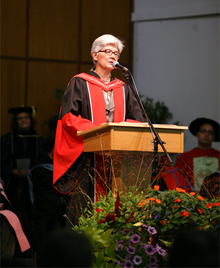
Dr. Emoke J. E. Szathmáry spoke at the Providence College and Seminary fall convocation event.
“Dr. Szathmáry reviewed the history of post secondary education in Manitoba describing how faith-based post secondary colleges were instrumental in the founding of all four provincial universities (St. Boniface, Manitoba, Winnipeg and Brandon),” said Dr. Gus Konkel, president of Providence. “She affirmed that, in the present, faith based schools have an important role in post secondary education, just as they did when the current secular universities began.”
Dr. Szathmáry treated the Providence community to an account of her personal experience with religious schools, a history that includes attendance at St. Michael’s College in Toronto as well as current membership at St. Paul’s College at the U of M.
“My life has not been outside the influence of religious colleges,” said Dr. Szathmáry, who also explained that the foundations of many secular schools are rooted in religious institutions.
“My point in recounting this history is that, though the University of Manitoba was established to be non-sectarian, its foundation depended on the willing co-operation of sectarian institutions,” said Dr. Szathmáry. “This is true for all of the colleges established in Manitoba before the current century.”
“There is no question that many Manitobans believe that there is a need for education in an environment that reflects a particular cultural and/or religious heritage. Government, which has continuing need of a well-educated citizenry, has allowed and in some instances fostered the establishment of such entities. Simultaneously government has crafted institutional statutes in such a manner that learning and inquiry in secular subjects can proceed without interference by governors and regents, whatever their religious or cultural orientation.”
Dr. Szathmáry’s address, though challenging, also emphasized that faith and reason complement each other. One comment particularly helped to further explain that it is important that there be freedom to pursue knowledge from a Christian perspective in faith-based schools.
“Students who want to study science, however, regardless if they want to study it at a secular institution or a faith-based college, have needs that must be met just like students who want to study literature, or music or philosophy (you name the field),” said Dr. Szathmáry. “They need people educated in their fields of knowledge to teach them. But why should society spend money to teach them? Because society needs educated citizens, as it has always had a need.”
With these comments, Dr. Szathmáry led into, and certainly accomplished, the goal inferred in the title of her speech, which was to articulate “The Importance of Religious Colleges: a Secular Perspective.” Dr. Szathmáry also put forth that religious colleges are perhaps the best at educating the “whole person” and that perhaps this is why many universities continue to remain affiliated with many smaller colleges.
Dr. Szathmáry said, “We expect that on graduation, students will exhibit a variety of skills, such as literacy in oral and written forms, numeracy, and mastery of basic communications technology. We expect them to know how to think, and to have developed lifelong habits of learning. We expect them too, to function in a pluralistic world, and remain true to ‘civic virtue’.
“A good argument can be made that with these kinds of expectations, small colleges that focus on the education of the whole person serve the needs of students the best. In large universities that have a multitude of disciplines, for example, hundreds of students can compete for the attention of one professor.”
Dr. Szathmáry concluded by voicing her support for Providence, a school with which she has been long acquainted through her connection to Dr. Konkel; she was also the speaker at Dr. Konkel’s appointment as president of Providence.
“Here, at Providence College and Seminary, it is possible to be exposed to the best teachers – the caring but demanding instructors who know their fields, and can spend time to get to know their students,” said Dr. Szathmáry. “The faith tradition that is the guiding light of this institution, has brought instructors with similar values together, though they are not all necessarily members of the same faith community. As such they are exemplars, and from them students can learn that it is possible to live life with meaning, to give expression to the truths that drive us, motivate us in our daily lives, secure in the knowledge that we live and breathe in Him who holds our being.”



